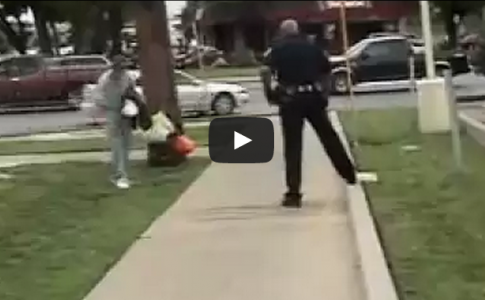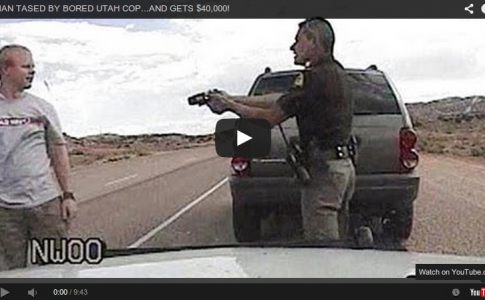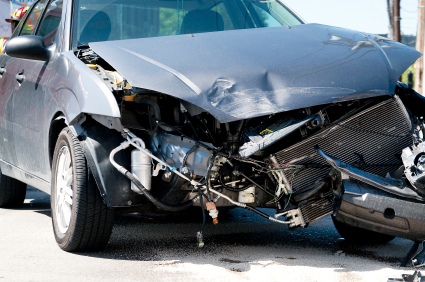It’s not hard. Why does it get messed up so often?
Author: matthaiduk
Dog Searches Are As Accurate as We Say They Are.
Anybody who has driven from the Geneva/St. Charles area west to DeKalb has seen the billboards for Bradley Olsen. I see it all the time on my way to the various courthouses and, although I don’t know anything about Mr. Olsen or his disappearance, I do have a passing interest in the case. No only for my own “I wonder what happened” curiosity, but also because “solving” missing persons cases is often messy and can lead to arrests based on compromised or not-very-reliable evidence.
If you don’t think so, read up on the Mario Casciaro case in McHenry County. After several years of investigation the government struck a deal with a man (with a lengthy criminal history) who likely threw the death blow in order to convict another man (who, apparently, did not throw a fatal blow or have a similar history) on an “intimidation” theory. The conviction has caused such a mess that 20/20 has been interviewing people and may be running a story on the case.
Anyhow, the Olsen case is back in the Kane County Chronicle because the investigation into his disappearance is entering its 7th year. The police continue to follow up on leads and have done several searches when new evidence warrants it:
Police insist that Bradley Olsen’s disappearance is not a cold case. The active investigation involves K-9 searches about three to five times a year. Any time police receive a tip of someone saying they think Bradley Olsen was buried in a certain location or seen in another location, they check it out.
DeKalb police detective Lt. Bob Redel, now the lead investigator on the case, has been involved since the beginning. He believes Bradley Olsen is dead and wants to know how he might have died. There are many people of interest in the case, though Redel declined to specify how many there are and why they are designated as such.
“We need the right person to call us that either saw something or heard something that’s going to lead us to where Brad’s at,” Redel said.
Of course the “right person” is likely someone personally involved in Mr. Olsen’s disappearance who’s screwed up so bad in some other way that he’s willing to possibly incriminate himself on the Olsen case to walk on the new one.
That’s not the part that caught my eye, though. The part that caught my eye was the comment about using canines to search, and about their accuracy:
In more recent years, police have not found evidence when dogs have searched different areas in the county. Sometimes a dog alerts police to something that may be a clue, but it turns out to be nothing.
“Dogs aren’t perfect,” Redel said.
I read the “sometimes a dog alerts police to something that may be a clue, but it turns out to be nothing. Dogs aren’t perfect…” and chuckled. Why? Because it’s true. And honest. And likely something you’d never get a cop on the stand to admit to if you were cross examining him in a drug case.
Because, when it comes to dogs searching for drugs, humans, or other contraband in a criminal case, “there is no such thing as a false alert”:
(watch it until the end… seriously)
Nevertheless, hopefully Mr. Olsen’s family will have closure soon and the State’s Attorney’s Office, DeKalb and Maple Park police departments won’t have built a case on unreliable evidence.
Nobody Cares If You Used To Be a Prosecutor
I’m in law school and think I want to be a prosecutor. It’s a noble profession, and all my friends and family approve. Why wouldn’t they? Too many criminals get off, and I’m feeling righteous so I’m going to do something about that.
So, before I even graduate, I’m looking to volunteer. I’m calling prosecutor’s offices all over- somebody could use some free help, right?
I work limited hours and summers for free as I finish out my schooling. I’m dedicated to my cause (and these jobs are competitive) so I go that extra mile and take criminal law classes in school. I even write my law school paper on the justice system, and how a more rigid system of penalties can fix the world’s problems. All of them.
The hard work pays off, too. I graduate, pass the bar and get hired on as an actual paid prosecutor. I love my job!
I start by working on traffic cases. Then I graduate to misdemeanors, and on to DUI. It’s a great job with great people, and I get to tell my friends and family how fun it is to put away all those “bad guys” that Nancy Grace talks about. I don’t bow to defense attorneys, and nobody gets a free pass on one of my cases!
One day, I’m sitting in court prosecuting people. All the sudden it dawns on me that even though I rock at this job and even though I’m fixing all the problems I whined about in law school, and even though my family knows I’m making the world a better place- even though there’s all of that, it’s like a switch got flipped and I want to defend people. Like, BAM! I can’t explain it but I’m just going to do it.
I don’t have any reason, let alone any good reasons.
That makes total sense, right? Of course it doesn’t. You know what makes even less sense? If I pretend (and advertise to the public) that being a former prosecutor makes me better at defending people.
Because, even though I’ve spent the better part of a decade locking people up and bragging to everybody about it, being a prosecutor is magic. It prepares you for everything. One day I was sitting in court and it just dawned on me… not only am I going to defend people for no real reason, I’m going to staff almost an entire office with people who formerly had zero interest in defending the accused.
Still makes no sense, right? If it does, you’re missing the sarcasm. You’re not the only one. (You can forward to about 41 seconds if you want to cut right to the part that makes me giggle).
He could have said he has a hard time sleeping knowing innocent people get convicted. Or that he doesn’t like that the system is more concerned with rules than the truth. Or, even, that the only way the system works at all is because there are people pushing back against the government.
He could have said any of that, or about a billion other things. He didn’t, though. Probably because none of that came to him.
You think former prosecutors have some awesome inside knowledge that makes them fantastic defense attorneys? Like, there is some secret handshake or prosecutor’s secret they teach you when you’re first starting out prosecuting speeding tickets? That’s exactly how it goes down. On your first day they call you into an office for a conversation that starts with, “If you tell anybody this prosecutor’s secret the whole world will collapse, but…”
I’ve said it before and I’ll say it again: there are some absolutely fantastic defense attorneys who were once prosecutors. There are also a lot of incredible defense attorneys who never prosecuted anybody. The idea that being a former prosecutor gives you a leg up on anybody is a ludicrous marketing technique. Nothing more.
Maybe next time he should let me write his youtube video. We can brainstorm real reasons to love this job. And we can talk about getting rid of that horrible, fake background.
Don’t Taze Me Cary, Illinois Bros.
Electrifying news from the Cary, Illinois police department! For the cost of only about ten thousand taxpayer dollars, seven of the officers are going to be armed with tazers. According to the Northwest Herald:
By JOSEPH BUSTOS – jbustos@shawmedia.com
CARY – Police officers in the village will soon be carrying Taser.
The village’s police department plans to equip officers with the electronic control weapons. Adding the additional level of use of force is set to cost the village about $10,750, according to Police Chief Patrick Finlon.
After training, the department will have seven units. The costs also include the battery packs, holsters and data packs, among other things.
This quote from the Cary police chief gave me the biggest chuckle, though:
The use of [electronic control weapons] has become an industry standard and with a properly developed policy and training in the area of tactics, court decisions and policy, the introduction of ECWs can reduce the possibility of injury to both law enforcement and offenders and thereby reduce exposure to the municipality,” Finlon wrote in a village memo.
That’s definitely true. There’s a flip side to that, though. Tasers can also be used improperly. They can be used to harm people who otherwise wouldn’t be harmed with “traditional” policing. They can be used by officers out of frustration, without a real reason- like this cop who tased a man as a result of a traffic stop (and subsequently cost his municipality another $40,000 plus whatever defending the lawyers cost in a law suit):
(the electrifying action comes just after the two minute mark)
I watch that and I wonder just what would have happened if that officer didn’t have a taser.
A few years back, over the course of a single month, I represented two men who had been tasered by the same department. Both incidents stemmed from traffic tickets. In one, the man getting ticketed refused to hang up his phone and the officer got frustrated. I seriously doubt either of them ever threatened harm to an officer. I also doubt either of them ever would have had force used against them if the officer didn’t have a taser. Tasers seem to be the preferred method of dealing with annoying people that otherwise might not be subjected to force.
That’s not to say that tasers don’t have their uses- clearly they do. It’s just that they seem to be over-used because they usually aren’t lethal. Of course, sometimes they are. And, when that happens, they cost the government tens of millions, not ten thousand dollars.
Hopefully this won’t be an issue in Cary.
Why Do Cops Let People Drive Drunk?
You know how drunk drivers are a danger? They cause accidents? You know how they kill people? You know how we can’t tolerate having impaired drivers on the road? You know how we are so gung-ho on punishing DUI that we won’t even tolerate a drunk driver pulling off the road to “sleep it off”?
Maybe none of that is true. Maybe it’s ok to let a drunk drive for a little bit. Or maybe keeping drunks off the road isn’t really as important as letting drunks on the road so we can then take them off the road and look like we’re doing some sort of good work. I don’t know.
I do know that last week I was watching a hearing on a DUI case up in good, old Woodstock, Illinois, McHenry County, U.S.A. From what I gathered (I missed a part), a cop was outside a bar late one night watching patrons as they leave. Nothing illegal about that- it seems that that’s the sort of place drunk drivers might be coming from. Good policing there.
Our hero watched a man leave the bar and cross the street. Apparently the man stumbled or fell… his movement was so obviously impaired by what was likely alcohol that the officer moved his car around to get a better view of where the guy was going. From the second spot, the officer watched the man get in the car and start it all up.
Then the officer did exactly what you’d expect him to do… Nothing. Once the man started the car and drove away, the officer followed. Of course, the man who couldn’t walk couldn’t drive either and, after watching him swerve all over the road the officer pulled him over and ended up arresting him for DUI.
Good police work you say? I don’t know.
Can’t a drunk driver kill somebody in a blink of an eye? Isn’t no distance the acceptable distance for an impaired driver to drive? Or, is there some magic rule that a drunk driver can’t plow into an innocent family as long as a cop is watching? Shouldn’t DUI prevention actually mean prevention regardless of who is watching? Safety is safety, right?
I know what you’re saying- this is America and a cop can’t tell the dude he’s not allowed to drive. I agree with that. But, this is also America and a cop can walk up to a drunk man, tell him that if he drives he’s going to get pulled over before he gets out of the parking lot, and strongly suggest the man call a friend or a cab. If cops can talk people into confessing to murder (even murders they never commit) can’t they talk people out of driving? Maybe my way is just silly.
My way doesn’t risk a drunk man on the street possibly killing somebody, though. My way doesn’t leave open the possibility of a high-speed pursuit with a drunk man at the wheel. My way also doesn’t net anybody an arrest or another smiley face on the record from AAIM.
My way keeps the streets safer, though. Isn’t that really what’s most important?




